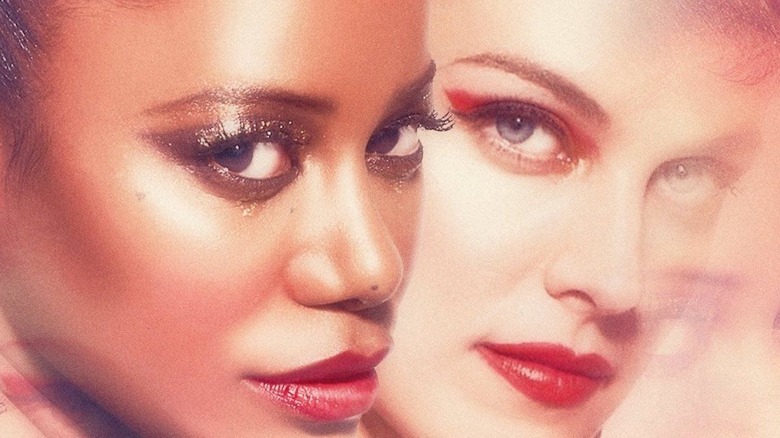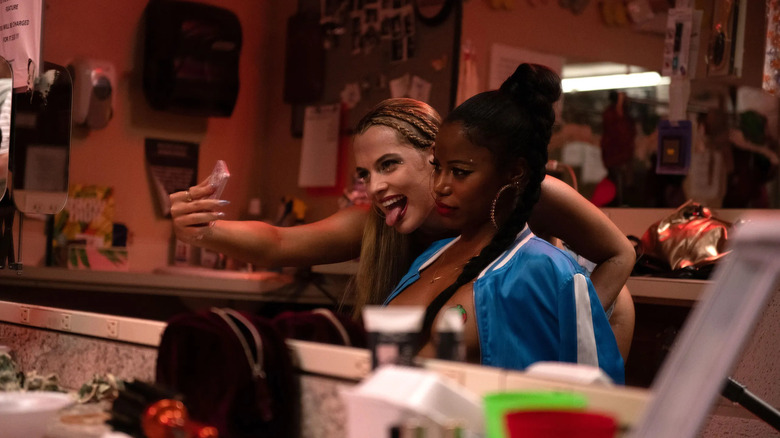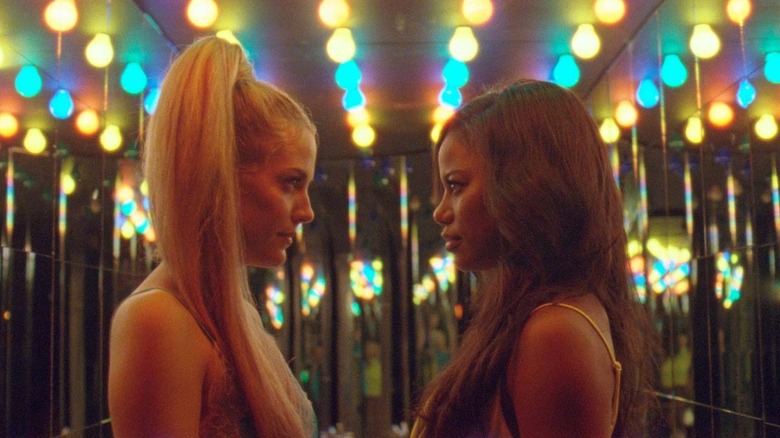Zola Review: A Live-Action Twitter Thread
In late 2015, waitress Aziah "Zola" Wells posted what would quickly become one of the most iconic Twitter threads in history. Known simply as "The Story," her tale of how she got caught up in the criminal underworld after befriending an exotic dancer immediately went viral, with thousands of users and celebrities poring over every detail within the 148-tweet thread. People quickly compared the whirlwind recounting of a nightmare weekend in Tampa to films ranging from "Pulp Fiction" to "Spring Breakers," with the world's media lining up to try and see if there was more to this story than 140 characters would allow.
In a Rolling Stone profile shortly after the Story became a worldwide sensation, Zola revealed that this wasn't her first time sharing her ordeal, but that the prior two attempts didn't pick up any traction online, so they were swiftly deleted. She realized that the darkness of a story about sex trafficking didn't exactly make for lighthearted reading. So she exaggerated some details, played up some others for laughs, and gradually transformed her story in real time when seeing a captive audience riffing in her replies. She stayed true to the spirit of what happened, but realized that an ever so slightly heightened version of events, seasoned with a healthy dose of dark comedy, would grab more attention than if she were to simply recount the grim details again. Those finishing touches were all she needed to become an unexpected overnight celebrity.
Nearly six years later, director Janicza Bravo has given Zola's story the big-screen treatment Twitter users were clamoring for. However, her hyper-stylized film doesn't aim to explore the greater truths behind the thread so much as give it a verbatim retelling, with nothing approaching the quick wit of its social media source material. Bravo does expand on some of the unspoken themes inherent in the thread, with the film's best moments offering sharp critiques of cultural appropriation, and the relationship between fact and fiction when sharing stories online. But for the most part, this is merely a stylish repackaging of a story told much more effectively in 140 character-increments.
Expanding beyond the character count
Zola (Taylour Paige), a waitress in Detroit, meets Stefani (Riley Keough), a dancer passing through town. The pair hit it off as both have danced in the past, and a day later, Zola gets a call insisting she join Stefani for a weekend in Tampa with the aim of making as much money as possible pole dancing. Making her excuses, Zola leaves with Stefani, her nerdy boyfriend Derek ("Succession" star Nicholas Braun) and a nameless pimp (Colman Domingo), whose name she won't discover until she arrives at the other side of this whirlwind 48 hours.
When they arrive in town, they find that pole dancing isn't the lucrative venture they both assumed it would be from past experiences, much to the ire of the pimp (identified in the end credits only as "X"), who Zola then realizes is the one in charge of the weekend itinerary. He calls up some of his contacts in town and demands the two women go meet them to get him the money he's missed out on. Zola refuses to participate and effectively becomes a madam to Stefani, identifying more lucrative ways of making money than the hookups X is sending their way. This of course just creates further tension for the rest of the weekend — between Zola and the pimp who discovers she's taken control of his operation, and Stefani and Derek, who becomes distraught hearing that his girlfriend has been making money in different ways.
"Zola" is at its strongest when Bravo and co-screenwriter Jeremy O.Harris untangle the weightier themes that exist only in the peripheries of the source material, with critiques of cultural appropriation and gendered racism that were largely unspoken in Zola's mammoth thread. This is predominantly explored through the deteriorating relationship between Zola and Stefani, a white woman who has uncomfortably appropriated various elements of Black culture, right down to speaking in a broadly racist imitation of an African American accent and utilizing various slang terms. Perhaps the sharpest critique of gendered racism is that this white woman is seen by the locals in Tampa as an object of sexual attention as she garishly imitates characteristics associated with a different culture, while the Black woman is looked past, the only compliment received during her time in Florida being an elderly man inexplicably telling her she looks like Whoopi Goldberg.
That a character who has transformed her personality into a confused appropriation of Black culture is played by Keough, the granddaughter of Elvis Presley, is a moment of ingenious casting on the part of Bravo. She uses Riley Keough in the same way Andrea Arnold did in "American Honey," where her antagonistic character casually walked around in a confederate flag bikini, a visual allusion to the relationship between the racism in two different American eras. Bravo said one of the key reasons she was drawn to making the film (the original director, James Franco, was ousted in 2018) was because she felt many filmmakers wouldn't give Zola the agency she deserved. Here, she makes Zola the closest thing to an audience surrogate, taking charge of her own story while commenting on it in the same way she did her own Twitter thread.
A Repackaged thread that could have been so much more
In the film's later stages, we get a brief sequence where we hear the story from Stefani's perspective, adapted from comments she made in a Reddit post after the original thread went viral, a fourth wall-breaking moment not entirely dissimilar from 2018's "American Animals." There is a reason these comments are brief; this is Zola's story, and the director didn't want to adapt it in a way that would belittle her or criticize the profession of sex work in the way Stefani's spin on events do. But this sequence made it clearer as to why, outside of the performances and sharply observed cultural criticisms, "Zola" left me feeling relatively cold.
With the story acknowledged in the Rolling Stone profile to be a heightened version of events by Zola herself, perspectives differing as to the specifics of what took place, the film merely teasing the idea of a more complicated relationship between fact and social media-friendly fiction feels like an insufficient way of acknowledging a far knottier truth. Bravo has imitated the style of social media right down to the most grating stylistic tics, the "tweet sent" sound punctuating Mica Levi's dreamy score every time the dramatized narrative passes each subsequent tweet in the original thread. But there is no depth beyond this in the way there is with the weightier themes elsewhere, only briefly acknowledging the variety of different perspectives this story was told from online. This quick glimpse at a much more incisive film which blurs the line between mockumentary and drama, getting to the heart about how we adapt our lives for social media attention, only makes the film's downbeat crime caper third act more of a disappointment.
"Zola" does add some depth to its social media source material, thanks to two excellent lead performances and a sharp undercurrent of cultural critique. But the relationship between fact and fiction in how this story is told remains under-explored, leaving only a dramatized version of Zola's take on events that were much more effective as a series of posts. A noble attempt at adapting a tweet thread, but one that should have been saved to drafts.


